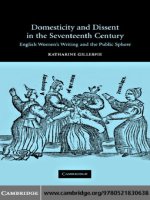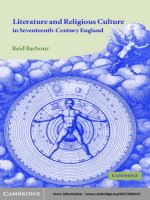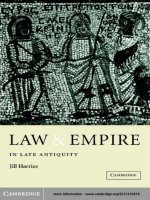0521854059 cambridge university press literature and favoritism in early modern england mar 2006
Bạn đang xem bản rút gọn của tài liệu. Xem và tải ngay bản đầy đủ của tài liệu tại đây (2.45 MB, 340 trang )
This page intentionally left blank
L I T E R AT U R E A N D FAVO R I T I S M I N E A R LY
MODERN ENGLAND
For writers in the early modern period, thinking about royal favorites
inevitably meant thinking about the uneasy intersection of the personal and the public in a political system traditionally organized
around patronage and intimacy. Depictions of favoritism in a variety of texts including plays, poems, libels, and pamphlets explore the
most fundamental ideological questions concerning personal monarchy and the early modern public sphere, questions about the nature
and limits of prerogative and about the enfranchisement or otherwise of subjects. In this study, Curtis Perry examines the ideological
underpinnings of the heated controversies surrounding powerful royal
favorites and the idea of favoritism in the late Elizabethan and early
Stuart period. Perry argues that the discourse of corrupt favoritism is
this period’s most important unofficial vehicle for exploring constitutional unease concerning the nature and limits of personal monarchy
within the balanced English constitution.
c u rt i s pe r ry is Associate Professor of English at Arizona State
University. He is the author of The Making of Jacobean Culture: James
I and the Renegotiation of Elizabethan Literary Practice (1997), the
editor of Material Culture and Cultural Materialisms in the Middle
Ages and the Renaissance (2001), and has had numerous articles and
chapters published on the subject of early modern English literature
and culture.
L I T E R AT U R E A N D
FAVO R I T I S M I N E A R LY
MODERN ENGLAND
CURTIS PERRY
Arizona State University
cambridge university press
Cambridge, New York, Melbourne, Madrid, Cape Town, Singapore, São Paulo
Cambridge University Press
The Edinburgh Building, Cambridge cb2 2ru, UK
Published in the United States of America by Cambridge University Press, New York
www.cambridge.org
Information on this title: www.cambridge.org/9780521854054
© Curtis Perry 2006
This publication is in copyright. Subject to statutory exception and to the provision of
relevant collective licensing agreements, no reproduction of any part may take place
without the written permission of Cambridge University Press.
First published in print format 2006
isbn-13
isbn-10
978-0-511-14638-1 eBook (EBL)
0-511-14638-8 eBook (EBL)
isbn-13
isbn-10
978-0-521-85405-4 hardback
0-521-85405-9 hardback
Cambridge University Press has no responsibility for the persistence or accuracy of urls
for external or third-party internet websites referred to in this publication, and does not
guarantee that any content on such websites is, or will remain, accurate or appropriate.
Contents
Acknowledgments
A note on texts
page vii
x
1 “Prerogative pleasures”: favoritism and monarchy in early
modern England
2 Leicester and his ghosts
1
22
“His pestelente nature”: figuring favoritism
Leicester’s legacy and the language of corruption
The resources of nostalgia
3 Amici principis: imagining the good favorite
Elizabethan ambivalence and the Protestant good favorite
Testing the good favorite in Jacobean drama
Arcana amicitiae: Charles I and the rule of the personal
4 Poisoning favor
25
34
44
55
58
70
82
95
Favorites and the work of darkness
Murder under the color of friendship
Poison “neere the head”
The politics of access and the poisoned body politic
Poisoned politics and the somatic imagination
“Too many Presidents of unthankefull men / Rays’d up to greatnesse”
5 Erotic favoritism as a language of corruption in
early modern drama
“We shall, lyke Sodom, feele that fierie doome”: passionate misrule in
A Knack to Know a Knave
Charlemagne and the uses of enchantment
“A Princes love extends to all his subjects”: favoritism and desire in
The Loyal Subject
“The corrupted use of Royal love” in Davenant’s The Cruel Brother
The crisis of degree in Love’s Sacrifice
v
100
104
108
116
121
128
131
137
146
154
163
173
vi
Contents
6 “What pleased the prince”: Edward II and the imbalanced
constitution
Marlowe’s Edward II and the politics of passion in the second reign of
Elizabeth I
Edward II as political palimpsest
“The Soveraigns Vice begets the Subjects Errour”: Elizabeth Cary’s anatomy
of misrule
7 Instrumental favoritism and the uses of Roman history
“Slaves to one man’s lusts / And now to many”: absolutism and favor in
Jonson’s Sejanus
“Hated instruments”: absolutism and favor in later Roman plays
“What are wee People?”: class and the republican critique of favoritism
Afterword: “In a true sense there is no Monarchy”
Notes
Index
185
189
202
216
229
234
249
265
276
286
322
Acknowledgments
Writing an academic book is in some ways a very lonely thing to do,
so it is a special pleasure to acknowledge here those colleagues, friends,
and family members who helped by offering advice, encouragement, and
distraction during the years I have been toiling away at this project. Perhaps most importantly, I have been blessed with brilliant and energetic
colleagues in Renaissance literature at Arizona State University, colleagues
who have shared their scholarly enthusiasms with me and who have helped
keep my own from ebbing: Jean Brink, Cora Fox, Scott Stevens, Ayanna
Thompson, and Melissa Walter. I am grateful to them for their advice and
encouragement, for reading chapters and prospectuses, and for the numerous conversations I have had with each of them that have helped clarify
my own thinking about the contents of this book. Taylor Corse has been a
godsend: he read most of these chapters, caught numerous errors, and made
crucial suggestions at crucial times. Outside of Arizona State University, I
am grateful (as always!) to Ruth Perry, who read and commented on most
of these chapters and who offered smart, helpful advice at every stage of
this project’s development. Thanks are also due to Charlotte Sagoff, for
her eagle-eyed reading of early drafts. Patrick Cheney read a section of this
project, and offered encouragement as well as sound professional advice.
Rowlie Wymer and Matthew Steggle both made very useful scholarly suggestions that have materially improved this book. And the argument of
the book has also been improved in countless ways by things I learned
from audiences when presenting aspects of it as work in progress at two
Renaissance Society of America conferences, one conference of the Group
for Early Modern Cultural Studies (GEMCS), conferences at University of
Hull and Harvard University, and a talk sponsored by the Medieval and
Renaissance Studies Program at East Carolina University (for which special thanks are due to Christine Hutchins). I am grateful, too, to Barbara
Lewalski and John Watkins for their support of me and of this project
during the past several years. My research on this project has been aided
vii
viii
Acknowledgments
greatly by some extraordinarily learned and generous people working in the
special collections of research libraries who patiently answered my inquiries
and who helped me secure microfilm copies of important documents that
I could not travel to see. In particular, I’d like to thank Georgianna Ziegler
at the Folger Shakespeare Library, Emily Walhout at Harvard’s Houghton
Library, Hilton Kelliher at the British Library, and Rosalind Green at the
Warwickshire County Record Office.
A book of this sort requires substantial insitutional support as well, and I
have been very fortunate in this regard. At one end of the process, Arizona
State University has offered considerable material support during all stages
of the maturation of this project, beginning with a Faculty Grant In Aid
that allowed me to do archival research in England in 1998, continuing
with a sabbatical leave in 2001–02, and some money from the College
of Liberal Arts and Sciences and from the English Department to help
cover a modest subvention that allowed for the book’s publication in its
present form. At the other end, I am grateful to Sarah Stanton, my editor
at Cambridge University Press, to two anonymous readers whose generous
response to the typescript made publication possible, and (in advance) to
all those whose help with copy-editing and formatting will go into the
finished product.
Though no section of the present volume more substantial than a halfparagraph has been printed elsewhere, I would like to note a number of
related essays that have played a role in my thinking about early modern
favoritism and that overlap with this book in minor ways. Two printed essays
represent early stages in my thinking about Marlowe’s Edward II and the
problem of favoritism. They are “The Politics of Access and Representations
of the Sodomite King in Early Modern England,” Renaissance Quarterly 53
(2000): 1054–83, and “Inwardness as Sedition in Heywood and Marlowe,”
in The Future of the Middle Ages and the Renaissance: Problems, Trends, and
Opportunities for Research, ed. Roger Dahood (Turnhout, Belgium: Brepols,
1998), 109–28. Though neither of these pieces has been repackaged here,
some sentences and key formulations have found their way from each of
these essays into the present study and I am grateful for permission to
reuse the material. Likewise, a handful of sentences scattered throughout
chapters 1, 3, 5, and 6 of this book appear in a very different context in
“1603 and the Discourse of Favouritism,” forthcoming in The Accession of
James I: Historical and Cultural Consequences, ed. Glenn Burgess, Rowland
Wymer, and Jason Lawrence (New York: Palgrave). My basic argument
about Elizabeth Cary in chapter 6 of the present study is extended and
recontextualized (though none of the specific language is reproduced) in
Acknowledgments
ix
“‘Royal Fever’ and ‘the giddy Commons’: Cary’s History of the Life, Reign,
and Death of Edward II,” forthcoming in Elizabeth Cary, ed. Heather Wolfe
(New York: Palgrave).
Much of this book was researched and composed during time wrested
away from the demands of parenthood. It is appropriate, therefore, to
acknowledge not only the awe-inspiring competence of my wife Jaya, but
also the terrific daycare that both of my children have received while their
parents have been at work. Most of all, though, I want to thank my children
themselves – Vikram and Roshan – for being so loving to their sometimesharried parents. I cannot imagine a greater privilege than participating in
their lives, nor a greater antidote to the solitude of scholarship. This book
(like its author) is dedicated to them.
A note on texts
When quoting from edited or unedited primary texts, I have for the most
part reproduced spelling and punctuation from the editions of the documents that I have consulted. Except in other people’s titles, though, I
have modernized i/j and u/v, and in a small number of cases I have silently
expanded contractions, emended obvious typographical errors, or repunctuated unedited Renaissance texts in order to make them legible to modern
readers.
x
chap t e r 1
“Prerogative pleasures”: favoritism and monarchy
in early modern England
From the appearance, in 1584, of the enormously popular libel known
as Leicester’s Commonwealth to the assassination of the Duke of Buckingham in the summer of 1628, hostility toward seemingly all-powerful royal
favorites played a central role in the development and articulation of anticourt sentiment in England. Even after Buckingham’s death, royal favorites
continued to loom large in the English political imagination, providing
a convenient shorthand for corruption and tyranny in numerous plays,
poems, and polemics composed and circulated during the personal rule
of Charles I. This heated and ongoing controversy over the institution of
royal favoritism functioned during this entire period as both an arena in
which deep-seated political and ideological concerns were contested and as
a crucial symbolic vehicle for their public expression.
The sentiment behind the period’s interest in favoritism comes across
loud and clear in the remarkable title given to one of Sir Dudley Diggs’s
speeches from the parliament of 1626 as reprinted in 1643: A speech delivered
in Parliament concerning the evill consequences that doe attend this state by
committing places of trust into the hands of court-favourites wherby it doth
plainly appear to be the originall of all publick grievances and combustions of this
kingdom.1 Behind this extraordinarily sweeping claim about the significance
of court favoritism lies the fact that thinking about royal favorites inevitably
meant thinking about the uneasy intersection of the personal and the public
in a political system traditionally organized around patronage and intimacy.
Writers arguing about favoritism therefore do so in part to explore the
most fundamental ideological questions concerning personal monarchy
and the early modern public sphere, questions about the nature and limits of
prerogative and about the enfranchisement or otherwise of subjects. I want
to argue, in fact, that the discourse of corrupt favoritism is this period’s most
important unofficial vehicle for exploring constitutional unease concerning
the nature and limits of personal monarchy within the balanced English
constitution.
1
2
Literature and Favoritism in Early Modern England
The list of controversial Elizabethan and Jacobean figures seen as royal
favorites includes men like Sir Walter Ralegh, Robert Devereaux, 2nd Earl
of Essex, Sir Christopher Hatton (said to have had “more Recourse unto
her Majestie in her Pryvye Chamber, than Reason would suffice, yf she
weare . . . vertuouse and well inclined”), and Philip Herbert, Earl of Montgomery (King James’s first English favorite).2 But by and large the cultural
stereotype of the Machiavellian court favorite was developed in England
in relation to three particularly high-profile figures: Robert Dudley, the
Elizabethan Earl of Leicester, Robert Carr, Earl of Somerset, the Scottish
bedchamber favorite who rose to prominence following his knighthood in
1607 and who fell from grace in 1616 after being convicted of poisoning
his associate Sir Thomas Overbury, and George Villiers, the much-loathed
Buckingham, who replaced Carr in King James’s affections and who managed to become in time the favorite of Charles I as well.
Each of these men was influential in his day, and so the resentment that
their influence fostered in the hearts of rivals and opponents has everything to do with the cut and thrust of court maneuver.3 It is hard, though,
to read much that was said and written about these figures without realizing that there is more to the discourse of favoritism than just a series
of isolated court contests: the kinds of invective leveled against successive
favorites are so consistent as to hint at habits of political imagination that
extend beyond the context of any single career. This is true in terms of the
striking recurrence of what Robert Shephard has called the “bogey myths”
of favoritism – the way each favorite attracted a similar set of lurid scandal tropes – but also, more subtly, in the way that successive favorites are
pigeonholed by observers into the same ethically charged stereotypes set
in meaningful opposition to traditional models of honor and duty and
service.4 Well before Buckingham burst onto the scene, in other words,
Englishmen were likely to imagine royal favorites as religiously apostate,
cowardly upstarts, skilled in dancing but lacking in wisdom or military
training, dependant entirely upon the monarch’s errant whim, treacherous
and sexually omnivorous, and all too ready to make use of the black arts
of sorcery and poison. In fact, there is considerable reason to believe that a
figure like Buckingham attracted these forms of opprobrium because they
were already current as ways to think about the problem of the royal favorite
before his political debut.
The figure of the all-powerful royal favorite, in other words, is a cultural
fantasy, one developed in relation to historical persons and situations but
one best understood in larger mythic or ideological terms. The appropriate
questions to ask, therefore, have to do with the cultural work performed by
“Prerogative pleasures”
3
representations of favorites: why were the recurring stereotypes concerning
favorites compelling? To whom were they compelling? What larger theoretical questions are raised in the discourse of favoritism? What kinds of
answers are supplied? What, in this larger sense, is the period’s fascination
with the idea of the all-powerful favorite really about? Asking these questions quickly leads beyond the world of court politics narrowly construed,
for the discourse of favoritism includes images of corrupted court intimacy
and its socio-political affects that clearly appealed to a broader cross-section
of the population than the direct rivals of the favorites themselves. English
writers of all kinds produced an avalanche of plays, chronicles, verse histories, epigrams, memoirs, prose fictions, and polemics that explored the
contours of the problem of royal favoritism. For example, though only a
small handful of them are well known today, there are upwards of fifty
extant plays from 1587–1642 that deal centrally with the problem of royal
favoritism. Add to this the number of plays containing anticourt satire
that pointedly alludes to Leicester, Somerset, or Buckingham, or that feature sustained thematization of the politics of intimacy, and that number
could easily be trebled. Likewise, historians and literary scholars are only
now beginning to take note of the massive corpus of politically topical
poems and polemics that circulated widely in manuscript, especially from
the 1620s on.5 These deal prominently, though not of course exclusively,
with the controversial royal favorites who became figureheads for anticourt
sentiment. All of these disparate kinds of writing – fictions, histories, libels,
and polemics – constitute the discourse of favoritism.
That phrase may seem to impose too much unity on what is, finally,
a very heterogeneous body of texts. But it is a central premise of this
book that we can in fact uncover, by attending carefully to the tropes,
stories, and dramatis personae with which favoritism is figured, a sustained
and often sophisticated engagement with key theoretical questions about
the ancient constitution and the limits of prerogative. This is a book, in
other words, about the way literature in general helps perform a kind
of cultural work usually thought of only as the job of political theorists.
The Elizabethan and early Stuart fascination with the figure of the corrupt royal favorite, I want to argue, reflects a profound ambivalence about
the legitimacy of personal intimacy as a political mechanism and thus,
by extension, explores questions concerning the nature of the relationship
between monarch and subject that contribute, ultimately, to the emergence of proto-republican ideas about public service, to what Annabel
Patterson has recently discussed as the seventeenth-century origins of a liberal political thought, and to what J¨urgen Habermas has famously called
4
Literature and Favoritism in Early Modern England
“the structural transformation of the public sphere.”6 Though I am of
course leery of the teleological impulses that have typically accompanied
this kind of argument, it is worth being very specific here about the ways
that Elizabethan and early Stuart debates about court favoritism help lay the
groundwork for larger transformation of the kind theorized by Habermas.
Most obviously, these arguments help re-imagine the relationship between
the personal and the public. That is, hostility to favoritism tends toward
the emergence of a critique of personal monarchy and, as Habermas argues,
“civil society came into existence as the corollary of a depersonalized state
authority.”7
We might also think of the impact of the discourse of favoritism on the
emergence of a public sphere in terms of its impact upon the dissemination
of news and the encouragement of thought and conversation about public
matters beyond the confines of the court. Before the advent of printed
newspapers, a great deal of politically sensitive information was circulated
in manuscript. Much of this material deals with controversial favorites,
of course. More significantly, interest in controversy concerning favorites
played an important role in the development of manuscript culture and
thus in the kind of readerly counterpublics made possible by it. H. R.
Woudhuysen has suggested that manuscript circulation of Leicester’s Commonwealth (a libel that was vigorously suppressed by the government in its
printed form) may have provided the key model for the subsequent circulation of politically charged material, and it is possible too that demand
for information concerning the scandals that beset Somerset in 1613–16
resulted in a general strengthening of the networks by which manuscript
news and libels were disseminated.8 There can be no question, certainly,
that libels concerning Buckingham are among the most widely circulated
manuscript materials throughout the 1620s and 1630s. Because the circulation of manuscript material conforms to pre-existing social networks, it
is to some degree a phenomenon limited to the elite. But there is considerable evidence that these materials were read by a broad cross-section of
literate subjects, and not only in London.9 Moreover, Alastair Bellany has
recently argued that the circulation of ballads, rhymes, and oral gossip as
well as libels and newsletters would have helped make court scandal a topic
of discussion among an even wider variety of ranks and classes.10 It seems
appropriate to say, therefore, that the furor surrounding favoritism is an
important part of the pre-history of Habermas’s bourgeois public sphere
both because of the kinds of political ideas explored within the discourse of
favoritism and because of the kinds of semi-public exchange this discourse
participated in and helped to encourage.
“Prerogative pleasures”
5
To avoid teleology, though, it helps to think of the ongoing debate over
favoritism not (or not only) as a precursor to more modern forms of political
thought but as the manifestation of a fissure built into the edifice of English
constitutional monarchy, the system of government described by Sir John
Fortescue as “dominium politicum et regale” (political and royal dominion).11
Fortescue, famously, distinguishes between English constitutional monarchy and absolutist monarchs on the continent who rule according a system
of civil law whose first premise is that “what pleased the prince has the
force of law.”12 By contrast, the English king, ruling “politically” – with
parliament and by means of native common law – triumphs as a ruler by
suppressing his own will, thereby minimizing its potential to lead him into
tyranny:
a king is free and powerful who is able to defend his own people against enemies
alien and native, and also their goods and property, not only against the rapine of
their neighbours and fellow-citizens, but against his own oppression and plunder,
even though his own passions and necessities struggle for the contrary. For who
can be freer and more powerful than he who is able to vanquish not only others
but also himself? The king ruling his people politically can and always does do
this.13
Fortescue is interestingly ambivalent, here and elsewhere, about the personal
aspects of royal government. For even as he praises the English constitution
for helping to rein in the monarch’s personal weaknesses, he treats the
resulting self-abnegation as a kind of neo-stoic personal triumph of royal
character itself. Our kings, Fortescue seems to be saying, are personally great
because they govern themselves and they govern themselves because our
institutions govern them. This ambivalence about the royal will, I would
argue, survives more or less intact in the early modern English political
imagination, and helps contextualize the period’s anxious uncertainty about
the status of royal favorites, real or imagined political agents who owe their
wealth and influence to their status as that which “pleased the prince.”
The resulting ambivalence about the validity of royal pleasure and the
politics of intimacy is encapsulated by the useful phrase “prerogative pleasures” that I have chosen as the title of this chapter. This phrase originates
as a description of royal favoritism offered up in an anonymous play called
The Faithful Friends that was most likely written during the 1620s. This
play, set in pre-republican Rome, opens with a debate about the preferment
of a young royal favorite named Marcus Tullius who, to the consternation
of his political rivals, has just been appointed to lead the Roman armies
against the Sabines. The ensuing controversy was no doubt designed to
6
Literature and Favoritism in Early Modern England
evoke for contemporaries the controversy surrounding Buckingham, who
was made admiral of the English navy in 1619. Criticism of Buckingham’s
performance in that office – particularly after the military failures of the
mid-1620s – was widespread, but The Faithful Friends is an essentially royalist play, one that defends not only the king’s choice of servants but more
generally his right to choose them. And here, in the play’s opening scene,
the vituperation of Tullius’s enemies is rebutted with what is apparently
supposed to be a stirring defense of favoritism by a upstanding young man
named Marius:
pardon mee
if I make question of your loyalties
that dare disparrage thus my soveraigns choyce
of his respected subject, it infers,
a doubt made of his wisdome, why should wee
tax the prerogative pleasures of our Prince
whom he shall grace, or where bestowe his favors
that Law’s allowed to every private man,
then to confine or disallowe a king
were most injurious and preposterous.14
Marius’s argument moves uneasily between two highly conventional but
subtly contradictory defenses of favoritism. First, he argues that to oppose
the favorite is to challenge the king’s right to make appointments and is
therefore tantamount to treason. This defense hinges, we might say, on
the uniqueness of the king and on the notion that the king’s “wisdome” is
beyond question: favoritism as arcana imperii. But then, awkwardly, Marius
shifts his ground, suggesting that to deny a king freedoms enjoyed by
private men is a preposterous inversion of hierarchical order. The bestowal
of personal favor is thus imagined as at once a representative act of the
king’s political wisdom and, by analogy, as a personal choice appropriately
protected from public scrutiny.
The phrase “prerogative pleasures” acts as the pivot between these two
formulations, and nicely captures the uneasiness of their conjunction. For
there is a kind of latent semantic tension between the resolutely political
connotations of the word “prerogative,” particularly in the context of an
argument about royal appointments, and the defense of pleasure as a private
pursuit. A “private man” is a man who does not hold office, and we can
therefore hear, in Marius’s use of the word “private,” Habermas’s definition
of it as “the exclusion from the sphere of the state apparatus.”15 The problem
with “prerogative pleasures,” though, is that they are not so excluded, a
“Prerogative pleasures”
7
nagging dissonance that becomes even more vexed as the speech progresses.
Kings, Marius explains, are “subject to their passions.” Thus:
Alexander the great had his Ephestion
Philip of Spaine his Lerma, not to offend.
I could produce from Courts that I have seene
More royall presidents, but ile not give
such satisfaction to detractive toungs
that publish such fowle noyse gainst a man
I know for truly Vertuous.16
Given that the correlation between government and self-government is an
absolute commonplace of early modern political theory (as in Fortescue),
the declaration that kings are subject to passions is ambiguous at best as
a defense of personal favoritism. And the examples cited do not reassure.
To Englishmen in the 1620s, the court of Spain was the very house of
treachery, and so Marius’s invocation of Philip III is a poor defense of his
“soveraigns choyce / of his respected subject.” Alexander, too, is frequently
used to exemplify precisely the conflict between royal greatness and the
disfiguring effects of passion. One thinks of Lyly’s Campaspe (1584), where
Alexander has to overcome his own affection for the title character, or of
Fluellen’s description of him as a flawed and overly passionate ruler (“a little
intoxicates in his prains”) in Shakespeare’s Henry V.17
Even Marius seems to recognize, albeit somewhat belatedly, that his list of
precedents could as easily be used as ammunition for the “detractive toungs”
of Tullius’s opponents as for the defense of “prerogative pleasures.” Hence
his hasty-sounding decision to cite no further examples. And the shakiness
of Marius’s defense of favoritism reflects an equivalent uncertainty on the
part of the play’s authors. The speech stands under double erasure in the
sole manuscript copy of The Faithful Friends: the whole speech is marked
for deletion in one hand and the second half again marked for deletion by
another.18 Marius’s awkward defense of favoritism is, in other words, a kind
of monument to the difficulty early modern writers had conceptualizing
the role of the king’s affections and pleasures within a system of political
thought that lacked a fully articulated distinction between the public and
private spheres.
One upshot of this conceptual difficulty is a tendency to imagine the
ideal ruler as being impossibly free of personal intimacies. This is what
Shakespeare does with Henry V (Fluellen’s antitype of Alexander).19 I’m
thinking here not only of the banishment of Falstaff – an attempt, perhaps,
to exorcise the specter of Richard II’s wanton favorites – but also of the
8
Literature and Favoritism in Early Modern England
scene in Henry V where the king exposes and excoriates the treachery of his
bedfellow and confidante Lord Scroop, one whom, as Exeter says, Henry
has “cloyed with gracious favours” (2.2.9):
What shall I say to thee, Lord Scroop, thou cruel,
Ingrateful, savage, and inhuman creature?
Thou that didst bear the key of all my counsels,
That knew’st the very bottom of my soul,
That (almost) mightst have coin’d me into gold,
Wouldst thou have practic’d on me, for thy use?
(2.2.94–99)
One purpose of this scene is to reverse the moral polarity of the banishment of Falstaff, so that instead of seeing the king as the betrayer of his
intimates we might see him instead as one betrayed by them. But it is striking that Shakespeare goes to such lengths to establish the king’s freedom
from personal entanglements as an authorizing attribute – he takes counsel
from representative figures from the church and peerage in Act 1, but not
from intimates like Scroop who might require special treatment or reward.
Instead of intimacy and bounty, Henry’s rule can as a result be conceived of
in terms of what the chorus calls “a largess universal, like the sun” (4.0.43).
This idea of monarchy uncorrupted by the personal makes more sense as
an ideological fantasy than as a practical or proscriptive idea of government.
No early modern king ruled impersonally. It is not even clear what that
would mean in terms of real, lived experience. I am struck, moreover, by
the dissonance between this fantasy of rule and the emphasis elsewhere
in Tudor political writing upon the importance of intimacy for securing
sound and reliable counsel for the monarch. For, though intense personal
friendship is not the only way of imagining the bond between the king and
his agents, and though (as Laurie Shannon has recently described) there are
subtle tensions between the egalitarian language of classical friendship and
the realities of political hierarchy, intimacy and friendship are nevertheless
an important and persistent way of imagining the laudable relationships
that make up the king’s service and provide much needed advice.20 Early
modern England, in other words, emphasizes the importance of the king’s
personal relationships while fantasizing that he or she might be able to rule
without them. This dissonance is encoded in the awkward crosscurrents of
Marius’s speech about “prerogative pleasures.”
Despite the real political influence of figures like Leicester, Somerset, and
Buckingham, the all-powerful royal favorite is also an ideological construct,
“Prerogative pleasures”
9
the exact inverse of the dream of the impersonal monarch. For at the core
of the culture’s paranoia concerning the royal favorite resides an impossible
figure of total apostasy and disaffiliation, a figure empowered entirely and
exclusively by the will of the monarch and thus freed from the kinds of
alliances and loyalties that might otherwise involve ethical constraint. As I
will argue in chapter 2, this is the great innovation of the influential libel
Leicester’s Commonwealth, a text that depicts the Elizabethan earl as a fully
protean and rapacious figure, an upstart from an upstart family unrestrained
by any larger system of religious or political loyalty. Of course, nobody, not
even a Leicester or a Buckingham, could operate politically while floating
free of the densely interconnected networks of obligation and affiliation
that shaped the horizons of possibility in the close-knit political world of
early modern England. But this radically disaffiliated figure, the monstrous
progeny of royal affection, is surprisingly prominent in the period’s figurative imagination. Where Shakespeare’s Henry V offers up the fantasy of
a king without attachments – all prerogative, no pleasures – the cultural
fantasy of the corrupt royal favorite embodies the opposite extreme: he is
the creature of the king’s prerogative pleasures, the symptomatic expression
of what happens when “what pleased the prince” trumps law and custom.
That is to say, recalling Fortescue’s analysis, the figure of the protean and
all-powerful royal favorite that figures so centrally in the period’s political
imagination is the personified manifestation of absolutism and its perceived
tendency toward tyranny.
Just as the discourse of favoritism includes many kinds of texts, so it contains a wide range of attitudes and postures concerning the link between
favoritism, absolutism, and tyranny. There are texts (Leicester’s Commonwealth is one, I think) whose attitude is evasive, attempting to explore
corrupt favoritism as the expression of royal will while finessing the awkward question of the king’s complicity. Other texts (we might think here of
Marlowe’s Edward II) seem carefully designed to explore the link between
favoritism and the king’s prerogative pleasures. In Jonson’s Sejanus and in
later Roman plays influenced by it, what looks at first like corrupt favoritism
turns out to be a screen for the workings of autocratic tyranny. In Caroline
court plays like Davenant’s The Fair Favourite (1638) the impulses of royal
will are themselves recuperated from accusations of tyranny along with the
institution of favoritism. But for all their manifest differences, the focus
on favoritism shared by all of these texts (and many more, discussed in the
pages that follow) is animated by a larger interest in prerogative pleasures:
in, that is, the nexus of concerns linking favoritism to larger questions about
10
Literature and Favoritism in Early Modern England
royal will, the limits of prerogative, and the political enfranchisement of
subjects.
The idea that the period’s endless debates about favoritism encode deeper
socio-political concerns is hinted at in a remarkable letter delivered to King
Charles from an anonymous “Ignoto” during the impeachment proceedings against Buckingham in 1626. For one thing, Ignoto argues explicitly
that attacks on Buckingham mask a deeper regicidal intent. Even more suggestively, the letter supplies a nicely paranoid history of controversy over
favoritism as an ongoing contest over the nature of monarchy itself. Puritans and other malcontents, the letter argues, began to make trouble “about
anno 23. Eliz. and spit their venom not only against the Bishops, but also
against the Lord Chancellor Hatton, and others, the Queens Favourites and
Councellors, as they do now against the Clergy and the Duke.” Faced with
similar dissent, King James “strengthened himself ever with some Favourite,
as whom he might better trust than many of the Nobility tainted with this
desire of Oligarchy.” Therefore: “It behoveth, without doubt, His Majesty
to uphold the Duke against them; who if he be but decourted, it will be the
Corner-stone on which the demolishing of his Monarchy will be builded.
For if they prevail with this, they have hatched a thousand other Demands
to pull the Feathers of the Royalty.”21 Though this letter clearly reflects the
specially paranoid mentality of the 1620s, the manner in which Ignoto reads
the attack on Buckingham provides a useful glimpse into the ideological
significance of the conflicts surrounding favoritism from the days of Hatton on: to attack favoritism is in a sense to attack the nature of personal
monarchy, or, more precisely, the personal aspects of royal power.
For this reason, I am not satisfied with the conventional notion that
attacking the king’s servants provides a way to voice dissent while maintaining a fundamental loyalty to the king. To be sure, this is very often the
rhetoric within which public attacks on the king’s associates are framed –
and one recognizes at once the utility of such a position for public discourse
under a king – but it makes just as much sense to argue that attacking
favorites provided a way to articulate criticism of a king and his government that would otherwise have had to remain unspoken.22 To put this
another way, the idea that criticizing the king’s intimates and counselors
deflected criticism away from the king is a variation on a common type
of sociological argument, the safety valve theory by which the expression
of resentments in encoded and displaced forms serves a socially conservative, cathartic function and thus enables the persistence of the system that
generated resentment in the first place. So: attacks on favorites are a safety
“Prerogative pleasures”
11
valve propping up monarchy by giving disgruntled subjects something to
rail against instead of the king. I am persuaded, though, by James Scott’s
alternative account of the operation of such displaced modes of expression
of oppositional sentiment as the mechanism by which oppositional affect
and related kinds of conduct are perpetuated despite the countervailing
pressures of decorum and orthodoxy. In this way, as Scott argues, we can
think of a lively culture of displaced or deflected opposition as “a condition
of practical resistance rather than a substitute for it.”23
Thinking of debates about favoritism as involving key questions about
the limits of personal monarchy helps explain the ongoing affective power
of the cultural stereotypes surrounding favoritism even after the violent
death of Buckingham in 1628. Though the duke had no real successor –
no subsequent Caroline courtier derived enormous political influence from
special personal intimacy with the king – Charles’s decision to rule without
parliament ensured that questions concerning the legitimacy of personal
rule would remain on the front burner. Throughout the period of personal
rule, court gossip kept heralding the emergence of new favorites, as if it
were hard to imagine a court, in the wake of Buckingham, without one.24
Two Caroline plays – William Davenant’s The Cruel Brother (1627) and
Lodowick Carlell’s The Fool Would Be A Favourite (1632–38) – feature subplots in which bumpkins attempt unsuccessfully to become court favorites,
and though the ambition is mocked in each case both plays assume that
there is something like an office of the favorite, a regular position at court
that a person might aspire to fill.25
The memory of Buckingham likewise helped structure subsequent
animosity toward other Caroline court figures. Henrietta Maria, deeply
resented by Protestant polemicists like William Prynne, was cast as a royal
favorite since she self-evidently owed her influence to her intimacy with
her husband the king.26 Though the Earl of Strafford did not enjoy a
special personal bond with King Charles, polemics surrounding his trial
and execution in 1641 nevertheless constructed him as a corrupt royal
favorite in the tradition of a Leicester or a Buckingham.27 One libel from
1640 even drew an analogy between Archbishop Laud and astrologer John
Lamb, who was murdered in the street by a London mob for his association with Buckingham in 1628: “Charles and Marie do what they will,
we will kill the archbishop of Canturbury like Dr Lambe.”28 We get a
very literal sense of the way old animosities were being recycled when
we note that this libel is itself a somewhat garbled updating of an earlier
squib predicting Buckingham’s death in 1628: “Let Charles and George
do what they can, / The Duke shall die like Dr. Lambe.”29 Buckingham
12
Literature and Favoritism in Early Modern England
remained a prominent figure in the Caroline political imagination long
after his death, and this has to do in part with his usefulness for thinking about the problematic nature of personal rule and its prerogative
pleasures.
The persistence of favoritism in the culture’s political imagination was
facilitated, too, by the publication and re-circulation, in the years following the collapse of Star Chamber, of numerous controversial texts associated with Leicester, Somerset, and Buckingham. These included speeches
by men like Dudley Diggs and Sir John Eliot who were remembered
as Buckingham’s chief parliamentary opponents, as well as multiple editions of notorious scandal sheets like Leicester’s Commonwealth, The Five
Years of King James (a particularly lurid history featuring a vivid account
of the rise and fall of Somerset), and The Forerunner of Revenge (a tract
accusing Buckingham of poisoning King James).30 The collecting habits of
manuscript compilers contributed to this discursive continuity as well: antiBuckingham material is ubiquitous in manuscripts compiled in the 1630s,
where it is often set next to controversial texts relating to the ascendancy of
favorites like Carr, Leicester, Essex, or Ralegh. This kind of juxtaposition
in collections of political libels often seems to point toward an interest in
favoritism as such, a desire to consider the institution and its implications
by comparing the varieties of favorites in recent memory.
The discourse of favoritism is characterized to a considerable degree
by the uncanny recurrence of tropes and motifs as well as by the explicit
recycling of old texts and ideas. This opens up vexed questions about continuity and discontinuity, cause and effect. If, as I suggest, the response
to Buckingham is preconditioned by earlier texts, and if the remarkable
hatred engendered by the duke helps shape anticourt discourse long after
his death, then should the discourse of favoritism be thought of as a meaningful part of the pre-history of the civil war? Yes and no. I do not wish
to argue, certainly, for any strong and specific causal relationship between
the discourse of favoritism and the outbreak of hostilities against Charles
I. But I do want to make two interlocking suggestions about the historical significance of this material. The first is simply that the texts I take
up in the chapters that follow provide ample evidence of real and persistent constitutional unease, especially in the 1590s and from the 1620s on.
Secondly, that the discourse I am surveying here is a significant native tradition of semi-theorized radical thought not because it provided anybody
with a political program but because writers kept returning to the inherited
language of corrupt favoritism to frame responses to new political circumstances. There is real continuity within the discourse of favoritism, but it
“Prerogative pleasures”
13
is best conceptualized in non-teleological terms as a gradual accretion of
useful structures of feeling in continual dialogue with specific, unique, and
unforeseen political circumstance.
For reasons that I have suggested above, I also want to suggest that the
royal favorite as an imaginative construct expresses a real anxiety about
absolutism – the tyranny of the king’s personal will – and does so long
before the reign of Charles I. I make this argument despite my admiration
for the work of Glenn Burgess, who has argued that the practice of Jacobean
politics was governed by a consensual language “based not on uniformity
of opinion (or even of theory), but on a recognition by most players in
the political game that there were a variety of languages of politics, each
appropriate in some areas and for some audiences.”31 More specifically,
where historians and literary critics have tended to treat the more stridentsounding Jacobean assertions of divine right as evidence of absolutism,
Burgess argues – persuasively, I think – that such language is used only in
carefully circumscribed contexts and that it coexists with the assumption
(as in Fortescue) that the English monarch rules via the common law.
Thus, King James was not really an absolutist, nor was absolutism an
important political position for his followers and defenders. Meaningful
conflict concerning such matters, Burgess suggests, emerged only during
the reign of Charles I, who “muddled the language of absolute prerogative
with that of common law” and thus put undue pressure on the consensual
position maintained more skillfully by his father.32
Literature, though, gives us access to a different set of players involved in
different kinds of language games in which consensual decorum is no longer
the main concern. To reverse Sidney’s formula: where official discourse
shows us a golden world of consensus, literary fictions can give us access to
the imaginary life of the brazen one. In some cases, like the chronicle play
Woodstock (1591–94), where the favorites of Richard II make a mockery of
property law and condemn as traitors all those who would “set limits to
the King’s high pleasure,” corrupt favoritism is linked quite explicitly to
the notion that monarchs were not bound by law.33 More often, though,
fascination with favoritism registers paranoia about the encroachments of
prerogative pleasure upon the laws and liberties of the ancient constitution
in subtler, more figurative ways. Still, as I hope will become clear in the case
studies that make up the individual chapters of this project, reading the
discourse of favoritism in these terms casts considerable light on meaningful
continuities between the constitutional concerns stirred up by Charles in
the 1630s and anxieties about the nature of personal monarchy in play from
at least the late 1580s onward.









